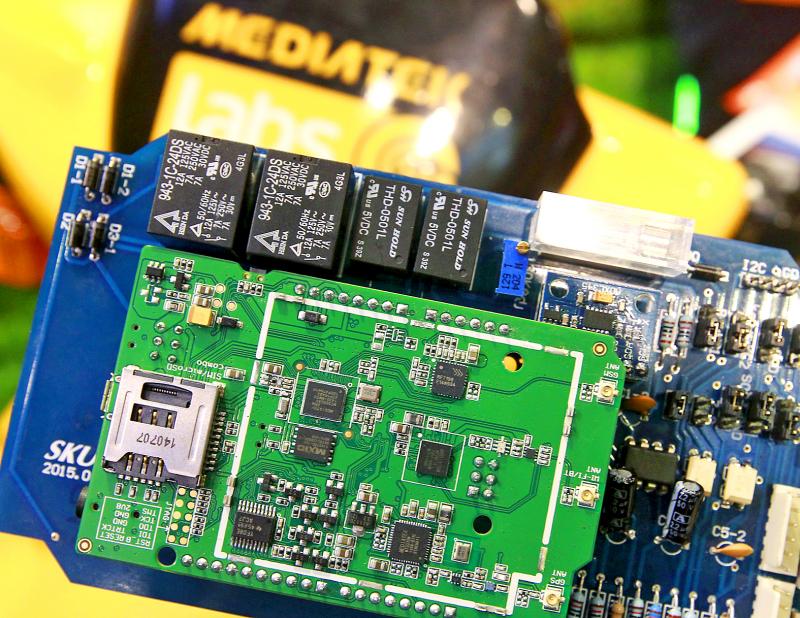MediaTek Inc (聯發科), the nation’s largest IC designer, became the world’s eighth-largest semiconductor supplier last year, a report from US-based market advisory firm IC Insights said.
MediaTek reported a more than 60 percent year-on-year increase in sales after posting US$17.7 billion in revenue last year, the report said.
IC Insights’ rankings excluded pure-play foundry operators such as Taiwan Semiconductor Manufacturing Co (TSMC, 台積電).

Photo: Pichi Chuang, Reuters
MediaTek and US-based Advanced Micro Devices Inc (AMD), which generated US$16.4 billion in sales and took the 10th spot, replaced Apple Inc and Germany’s Infineon Technologies AG among the top 10 semiconductor suppliers worldwide.
MediaTek and AMD held 2.9 percent and 2.7 percent market share respectively in the global semiconductor market, the report said.
South Korea’s Samsung Electronics Co held the top spot after generating US$82.0 billion of sales, ahead of US-based Intel Corp (US$76.7 billion), South Korea’s SK Hynix Inc (US$37.4 billion), Micron Technology Inc (US$30.0 billion), Qualcomm Inc (US$29.3 billion), Nvidia Corp (US$23.2 billion) and Broadcom Inc (US$21.0 billion).
Among the top 10 semiconductor suppliers, five were fabless IC companies — Qualcomm, Nvidia, Broadcom, MediaTek and AMD, the report said.
In MediaTek’s annual report, chairman Tsai Ming-kai (蔡明介) said that the company had worked with its pure wafer foundry partner to develop advanced processes, including 3D chipsets to support high-performance computing devices.
While Tsai did not name its partner, it is widely thought to be TSMC, as MediaTek is one of TSMC’s largest customers.
MediaTek last year posted revenue of NT$493.4 billion (US$16.74 billion) and earnings per share of NT$70.56.
Company data showed that MediaTek was the largest smartphone IC supplier in the world last year.
Tsai said he had faith that the firm’s strong cash flow and improving profitability would allow its shareholders to continue sharing the earnings of MediaTek.
MediaTek has proposed issuing a NT$73 cash dividend — NT$57 per share from its earnings and NT$16 per share from its surplus capital.
The NT$57 from its earnings represents about an 81 percent payout ratio and Tsai said that the company would continue to pay generous dividends to its shareholders.
Shareholders are to vote on the dividend proposal at MediaTek’s annual general meeting on May 31.

Three experts in the high technology industry have said that US President Donald Trump’s pledge to impose higher tariffs on Taiwanese semiconductors is part of an effort to force Taiwan Semiconductor Manufacturing Co (TSMC, 台積電) to the negotiating table. In a speech to Republicans on Jan. 27, Trump said he intends to impose tariffs on Taiwan to bring chip production to the US. “The incentive is going to be they’re not going to want to pay a 25, 50 or even a 100 percent tax,” he said. Darson Chiu (邱達生), an economics professor at Taichung-based Tunghai University and director-general of

‘LEGACY CHIPS’: Chinese companies have dramatically increased mature chip production capacity, but the West’s drive for secure supply chains offers a lifeline for Taiwan When Powerchip Technology Corp (力晶科技) entered a deal with the eastern Chinese city of Hefei in 2015 to set up a new chip foundry, it hoped the move would help provide better access to the promising Chinese market. However, nine years later, that Chinese foundry, Nexchip Semiconductor Corp (合晶集成), has become one of its biggest rivals in the legacy chip space, leveraging steep discounts after Beijing’s localization call forced Powerchip to give up the once-lucrative business making integrated circuits for Chinese flat panels. Nexchip is among Chinese foundries quickly winning market share in the crucial US$56.3 billion industry of so-called legacy

Taiwan Semiconductor Manufacturing Co (TSMC, 台積電) yesterday held its first board of directors meeting in the US, at which it did not unveil any new US investments despite mounting tariff threats from US President Donald Trump. Trump has threatened to impose 100 percent tariffs on Taiwan-made chips, prompting market speculation that TSMC might consider boosting its chip capacity in the US or ramping up production of advanced chips such as those using a 2-nanometer technology process at its Arizona fabs ahead of schedule. Speculation also swirled that the chipmaker might consider building its own advanced packaging capacity in the US as part

A move by US President Donald Trump to slap a 25 percent tariff on all steel imports is expected to place Taiwan-made steel, which already has a 25 percent tariff, on an equal footing, the Taiwan Steel & Iron Industries Association said yesterday. Speaking with CNA, association chairman Hwang Chien-chih (黃建智) said such an equal footing is expected to boost Taiwan’s competitive edge against other countries in the US market, describing the tariffs as "positive" for Taiwanese steel exporters. On Monday, Trump signed two executive orders imposing the new metal tariffs on imported steel and aluminum with no exceptions and exemptions, effective